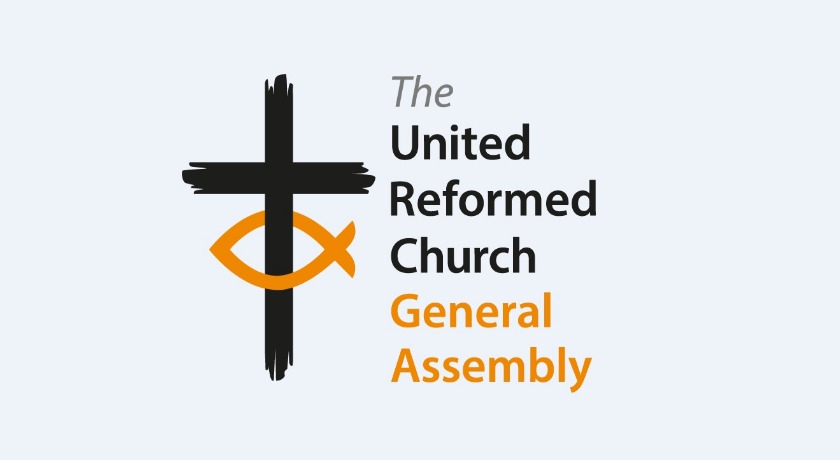 General Assembly, the key-decision making body of United Reformed Church (URC), opened on 9 July. Due to the Covid-19 restrictions, the meeting was held digitally.
General Assembly, the key-decision making body of United Reformed Church (URC), opened on 9 July. Due to the Covid-19 restrictions, the meeting was held digitally.
The 2021 General Assembly of the United Reformed Church began with the Constitution of Assembly in prayer by the Moderator of Assembly, Peter Pay.
Session One General Assembly
Opening worship
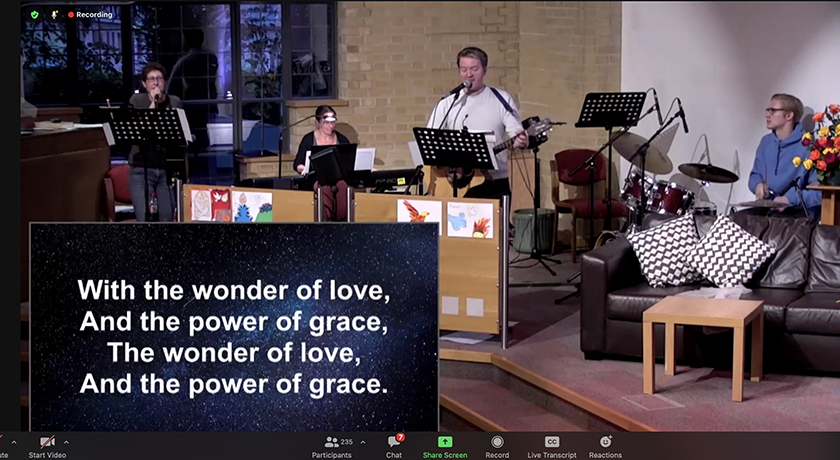 Opening worship was led by the Chaplain to the Moderators, the Revd Helen Everard. The band of Woking URC led Assembly in the hymn ‘Come all ye vagabonds’. The Revd Mike Thomason and Mrs Sue Thomason read from John 4.
Opening worship was led by the Chaplain to the Moderators, the Revd Helen Everard. The band of Woking URC led Assembly in the hymn ‘Come all ye vagabonds’. The Revd Mike Thomason and Mrs Sue Thomason read from John 4.
The Revd Barrie Cheetham, a recently retired minister and volunteer chaplain in Banbury town centre, led the Bible study.
Looking at the story in John 4 about Jesus and the Samaritan woman at the well, Mr Cheetham reflected on its connections with said noted its connections with town centre chaplaincy.
Jesus crossed cultural, social and religious barriers, he said, in talking to a Samaritan woman. “We often do the same as chaplains in Banbury, available to talk to anyone regardless of race, religion, age and social background.”
Another point of similarity, Mr Cheetham said, was how amazingly accepting and appreciative people can be of conversations about faith, even when they distrust organised religion.
This meeting with Jesus was a one-off, like many chaplaincy conversations, but “we don’t know what will be the effects of unexpected conversations and chance encounters.”
Mr Cheetham concluded by asking the Church “to pray for the chaplains in Banbury and everyone engaged in chaplaincy work that we can help people know that they also are loved and accepted by God”.
Act of Commemoration
There followed an act of commemoration for the Ministers, missionaries, Church-Related Community Workers, former Moderators and Clerks who have died since the previous Assembly. It was led by the General Secretary, the Revd Dr ohn Bradbury followed by a prayer from the Chaplain.
Worship concluded with ‘Brother, sister, let me serve you’, sung by the Revd Paul Robinson.
Greeting of Ecumenical and International Guests
The Revd Philip Brooks, URC Secretary for Ecumenical and Interfaith Relations, and Karen Campbell, URC Secretary for Global and Intercultural Ministries, welcomed and read the names of ecumenical and international guests attending General Assembly.
UK ecumenical representatives included: the Right Hon Lord Wallace of Tankerness, Church of Scotland General Assembly Moderator; the Revd Dr David Chapman Chair of Bedfordshire, Essex and Herts District, Methodist Church; the Ven. Vernon Ross, Archdeacon of Westmorland and Furness, Church of England; and Father Dominic Robinson, Parish Priest, Roman Catholic Church; Major David Evans, National Ecumenical and Faith Officer for the Salvation Army.
International guests included: the Revd Najla Kassab, National Evangelical Synod of Syria and Lebanon and President of the World Communion of Reformed Churches; the Revd Lydia Neshangwe of the Uniting Presbyterian Church in Southern Africa and Moderator of the Council for World Mission; Pfarrer Martin Henninger, Evangelische Kirche der Pfalz; and the Revd Dr Munther Isaac, Pastor of the Evangelical Lutheran Christmas Church in Bethlehem.
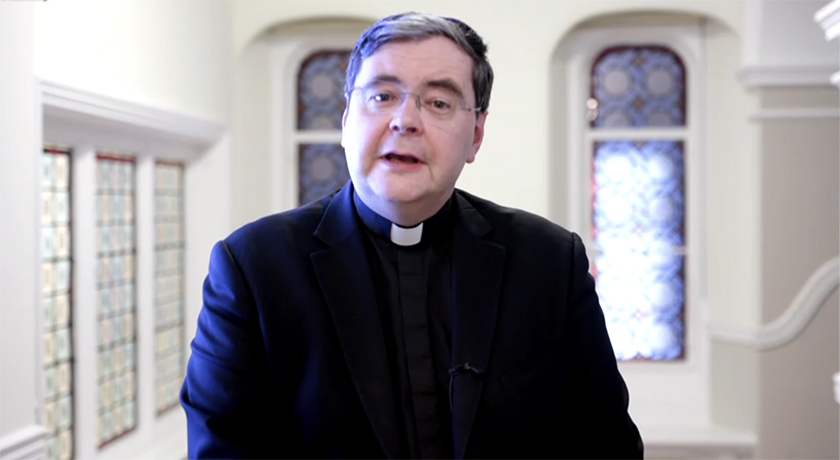 Speaking on behalf of UK ecumenical guests, Father Dominic Robinson, Parish Priest at the Church of the Immaculate Conception in Mayfair: “On all our behalf, thank you so much for the invitation to this United Reformed Church General Assembly it’s a real privilege and a joy to be here this weekend, joining you online.
Speaking on behalf of UK ecumenical guests, Father Dominic Robinson, Parish Priest at the Church of the Immaculate Conception in Mayfair: “On all our behalf, thank you so much for the invitation to this United Reformed Church General Assembly it’s a real privilege and a joy to be here this weekend, joining you online.
“During the last few years, I’ve been involved in the United Reformed Church and Roman Catholic dialogue. It’s been a wonderful experience, and it’s been an experience of sharing our faith, our faith in Jesus Christ which brings all Christians together and, which surely at this time as we emerge from the pandemic, is something we need more and more; to be united as followers of Jesus Christ the way, the truth, and the life.”
On behalf of international ecumenical representatives, the Revd Dr Munther Isaac, speaking from Bethlehem, said: “On behalf of the Palestinian Christian community, a community that is often neglected and ignored, but also greetings on behalf of the Lutheran community we’re so grateful for the relationship and developing partnership we have between our two communities.
“I speak to you from Bethlehem it is here that the greatest miracle of all happened, the incarnation of God, where the Word became flesh and dwelt among us. For me it is always a reminder that God is in solidarity with us, especially as humans in our difficult moments.
“The days in which Jesus was born were by no means easy or peaceful. Yet, it was in these days in a tiny town here in Bethlehem, in the midst of an occupying reality that God came to be with us. This is a reminder that God is with us in solidarity. That God is here to say: ‘I care, I feel, and I hear you.’
“This is what I pray for your General Assembly, I pray that God leads you to translate the words of the Gospel and the meaning of the Good News into Kingdom works of acts of solidarity with the poor and the marginalised.
“That the Gospel is translated into real action among people where we communicate that God is with us especially during these difficult and Covid-19 realties our world is going through. So, all the way from Bethlehem I want to wish you all the best for your meeting over the coming few days.”
En bloc resolutions
The following resolutions were passed en bloc. En bloc resolutions are voted on without debate, having been deemed uncontroversial. This has no reflection on their importance. The full reports and resolutions in each case can be read at urc.org.uk/general-assembly
A1 Mission Council Advisory Groups (resolution 6)
All Mission Council advisory groups become General Assembly groups, now that Mission Council will be meeting only once a year.
D1 Education and Learning: New URC Learning Hub
A report from the Education and Learning Committee on the creation of the URC Learning Hub.
D2 Education and Learning: The Way Forward – One year on
A report from the committee on the implementation of The Way Forward strategy that was agreed by General Assembly last year.
D-H1 E&L/Ministries: Lay Preachers and Worship Leaders
Following Mission Council’s approval, in March, of new pathways into ministry, this paper details the process for becoming a locally recognised worship leader or Assembly accredited lay preacher.
H1 Ministries Committee Report
An update on the work of the Accreditations Sub-Committee and the Assessment Board, particularly on ministry statistics.
H4 Ministries: Changes to Schedule E (resolution 25)
A change to schedule E in the Manual of the United Reformed Church, which lists the different categories of ministers in the denomination.
J1 Nominations: General report (resolution 37)
New appointments to committees.
J3 Nominations: Supplementary report
K1 Pastoral Reference and Welfare Committee Report
A report on the confidential work of the committee, including welfare grants.
T1 Safeguarding Advisory Group: Annual safeguarding report
An analysis of safeguarding annual church returns.
T5 Safeguarding: Safeguarding Training Framework (resolution 48)
General Assembly adopts the Safeguarding Training Framework for use across the Church, to be implemented by synods.
T6 Safeguarding: URC roles eligible for Criminal Records Bureau checks (resolution 49)
An update to the matrix of roles eligible for CRB checks.
Remaindered business from the 2020 General Assembly
The first resolutions passed at the 2021 General Assembly were those meant to have been passed had the meeting took place as usual last year.
Having followed the approval of Synods, which is needed to change matters connected to The Structure of the URC, General Assembly gave its final approval to the proposal that the role of Moderator of the General Assembly change to one person serving for one year, the model used until 2008.
The Moderator may be a minister of Word and Sacraments, A Church Related Community Worker or an Elder. Each synod may nominate one Minister and one Elder each year, but only one Moderator will be elected.
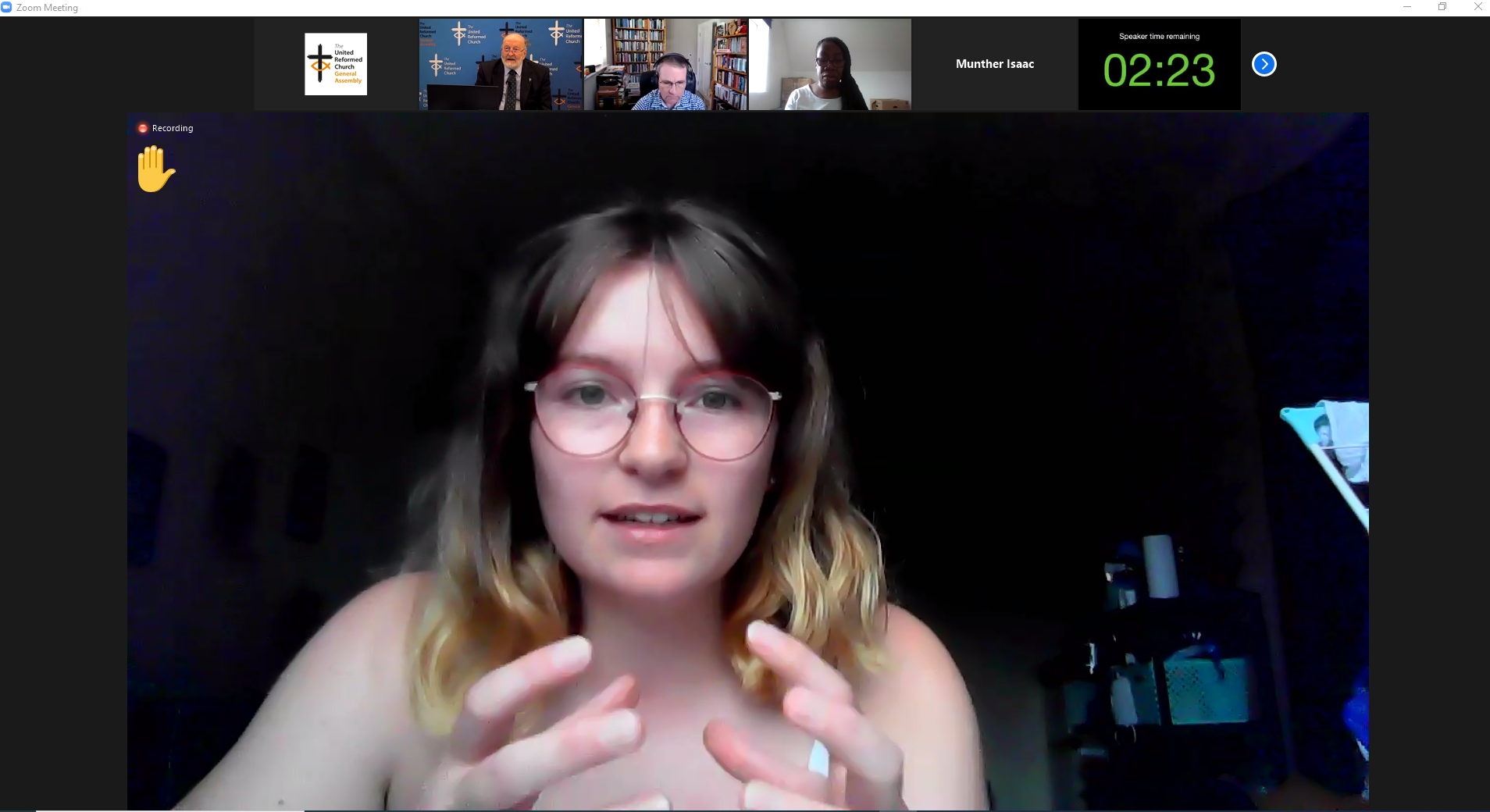 Victoria Turner reminded the Assembly about the representation of woman and minority groups in the role and the Clerk reminded local churches and Synods also to bear this in mind too when putting people forward for nominations for voluntary roles.
Victoria Turner reminded the Assembly about the representation of woman and minority groups in the role and the Clerk reminded local churches and Synods also to bear this in mind too when putting people forward for nominations for voluntary roles.
After a reminder about the reason why the name is being changed, to avoid confusion with the Mission Committee, General Assembly gave final approval to the proposal that the name of the Mission Council be changed to Assembly Executive.
This body will meet each November, to continue the work of the General Assembly and approve the following year’s budgets.
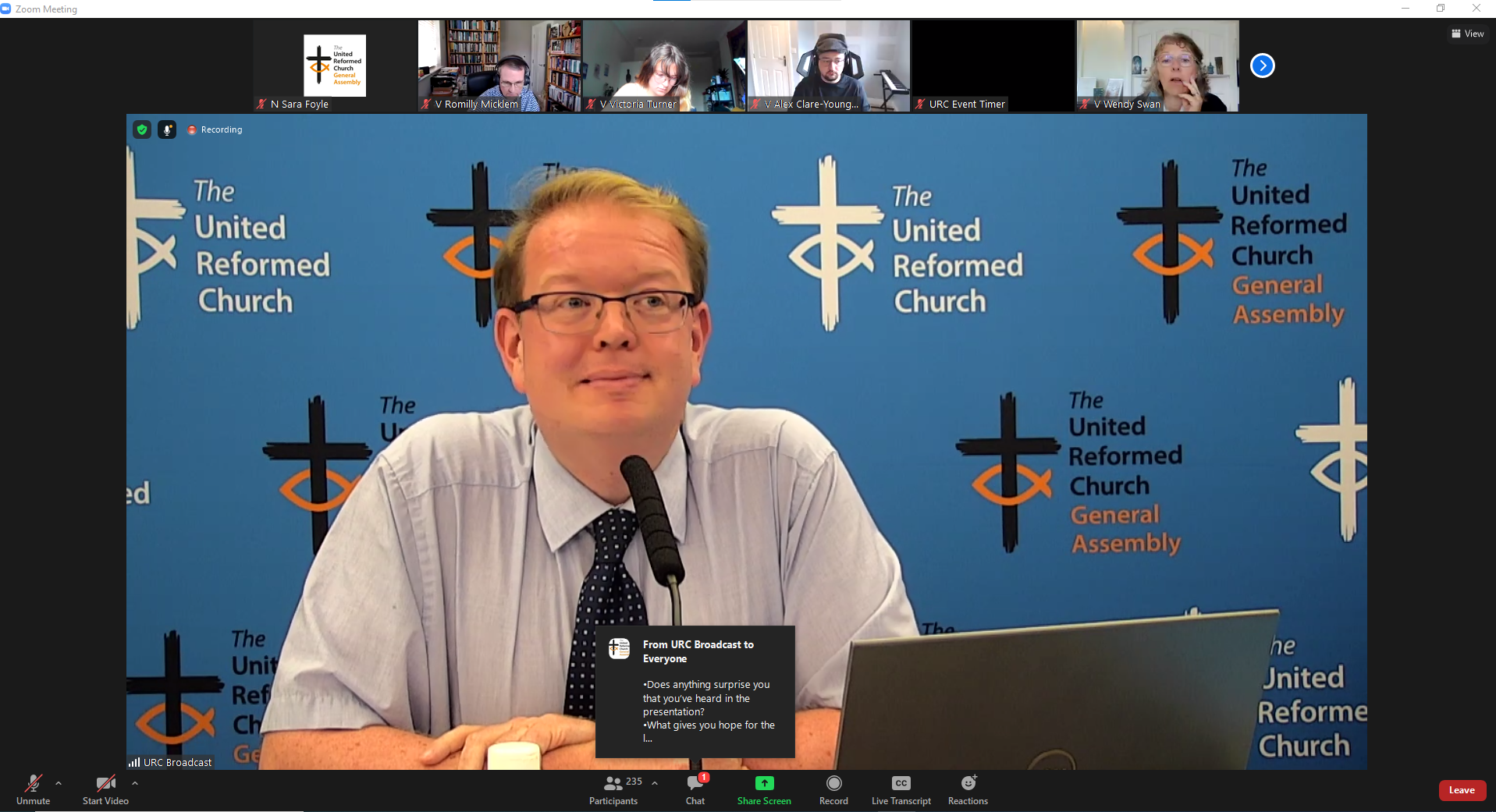 Church Life Review
Church Life Review
The Revd Dr John Bradbury, URC General Secretary, addressed General Assembly about the Church Life Review, initiated at Mission Council in March.
John began with a synopsis on why the review is taking place; the pandemic has highlighted strengths and weaknesses that the church has, pension discussions have revealed the complexities of the URC’s financial resources, more than 500 necessary vacancies are needed on the URC’s various committees and groups and they are increasingly hard to fill.
This has all led the URC to grasp the opportunity to take a step back and seriously review various aspects of the life of the denomination.
In consultation with the Nominations Committee, a review group has been appointed to carry out the review. Along with John, the group is formed of the Revds Steve Faber, Dr Tessa Henry-Robinson, Dr Phil Wall and Lindsey Sanderson, and Melanie Campbell, Muna Levin-Harris, Victoria Turner, and Gordon Woods.
At March’s Mission Council, it was proposed that the group present a remit and timescale for work to General Assembly.
However, John explained that there has been little time between Mission Council and General Assembly and the group has only met once during that period for two hours via Zoom.
However, he shared the group’s initial thinking and delivered this through a detailed PowerPoint presentation.
John began the presentation by “reminding ourselves that we were here” and referred to the Basis of Union – to adore God and worship through Christ, to receive and express the Holy Spirit, to be a proclaiming people to declare the reconciling and saving power of the life, death and resurrection of Jesus Christ, and to have a prophetic edge as we bear witness to Christ’s rule over the nations and the life of the world”.
“One key thing that leaps out of that,” said John. “Is the way we express being church ‘in each place, and in our total fellowship.”
John went on to say that this points to a significant set of questions that need answering: “Are we one church, 13 churches or 1300 churches? – and do we need one vision for the United Reformed Church or 1300 visions?
Since District Councils ceased to be, part of our reality has been that 13 different Synods have developed 13 sometimes very different ways of working.”
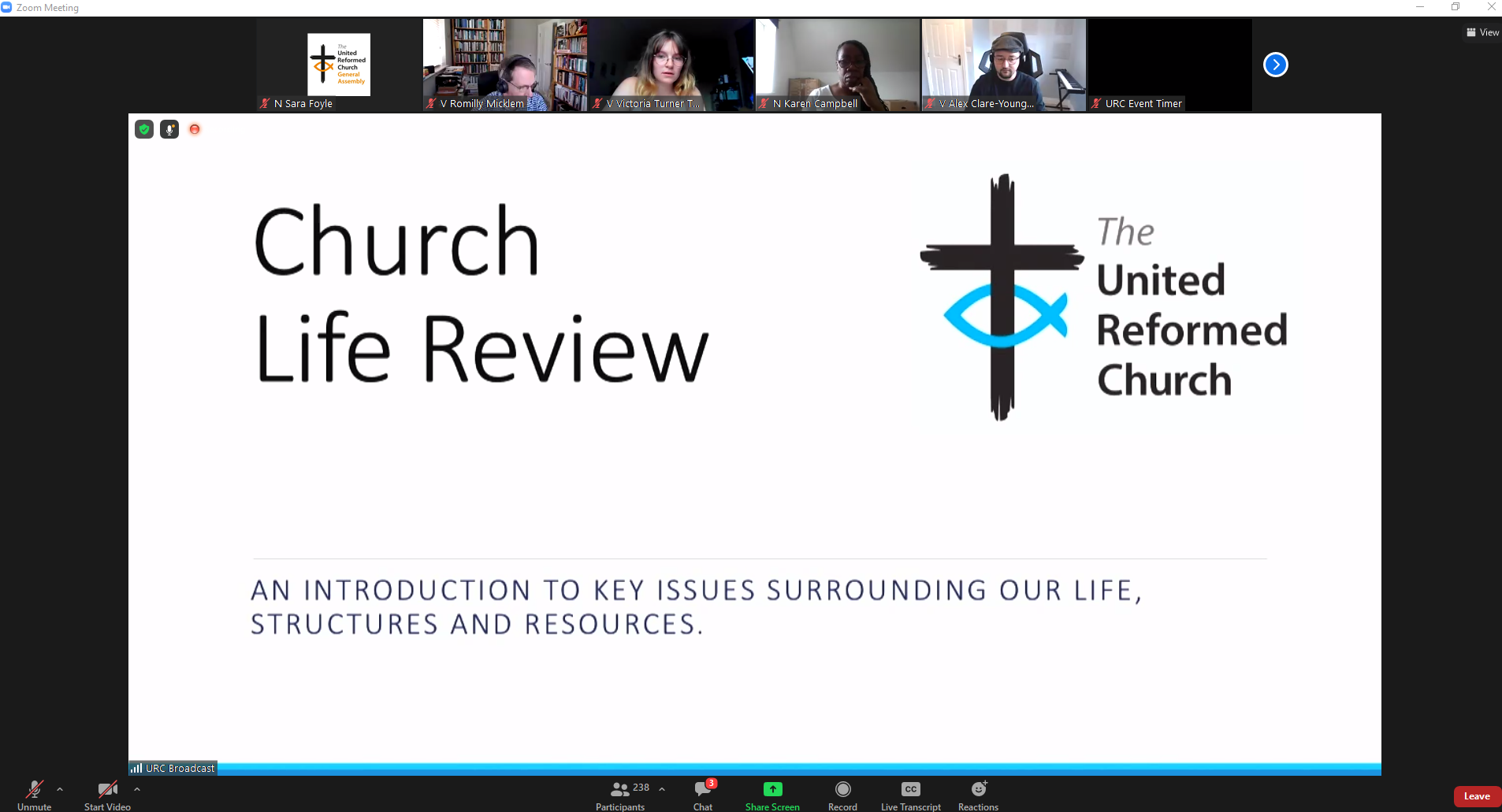 In the PowerPoint presentation, which is available on the URC General Assembly papers website, John highlighted statistics regarding the numerical decline since 1972. The stats presented accurate figures from 2008 then projected those figures forward on the same basis.
In the PowerPoint presentation, which is available on the URC General Assembly papers website, John highlighted statistics regarding the numerical decline since 1972. The stats presented accurate figures from 2008 then projected those figures forward on the same basis.
The statistics showed that by 2031: the URC will probably be a Church of around 25,000 members gathered in about 1,100 congregations, stipendiary ministers would number around 150, the average number of congregations per stipendiary minister would be 6+, and that the decline in serving and non-serving Elders is faster than the decline in the number of churches, leaving fewer local leaders to become overloaded and overwhelmed.
Other difficulties included not knowing what would local congregations most welcome in terms of support from the wider church for this worship, witness, evangelism and service.
John went onto show the various committees, advisory groups and departments that made up the structure of the URC, advising that a picture is painted of “a rather large and complex organisation, for a fairly small church”.
To paint a rough picture, there are 11 committees that report directly to the General Assembly, six advisory groups or task groups that report to Mission Council, (soon to be the Assembly Executive), the Assembly Committees and their work are grouped into departments at Church House which is overseen by three Deputy General Secretaries.
Each of these departments have a range of sub-committees and task groups.
In regard to the URC’s Trust structure, John explained that there are two main trusts supporting the work of General Assembly, the URC Trust and the Pensions Trust, and then 13 separate trusts that sit behind the work of the 13 Synods.
Financial resources showed – through looking at accounts submitted to the Charity Commission – that annually, the central church spends around £19.7M and Synods spend £14.6M on the actual work of the synod, not manses or large capital items.
Stipendiary ministry of Word and Sacrament and CRCWs and the related on-costs of National Insurance and Pensions are paid by the General Assembly from the M&M giving of local churches. Annually this expenditure amounts to nearly £14m.
However, the budget set each year is just over £5.5M. John said: “I confess I was rather startled, given the pressures on ministers, and the desire of so many local congregations to be able to access more stipendiary ministry than is currently possible, that we only spend about 40% of everything that we spend between the General Assembly and Synods on stipendiary ministry – and not all of that is spent on ministers in local churches. That figure includes 13 Synod Moderators, 5 ministers and CRCWs at church house, and ministers in Synod, rather than local roles too.”
In relation to Synod assets, John went onto show that as more and more congregations close and buildings sold, the net assets and investments held by Synods is increasing but the disparity in property values between Synods means that what one receives when a building closes varies hugely.
John also explained that as a whole the URC was worth £204m in 2019, up from £177m in 2018. He added: “As the family of the URC, we need some serious conversations about how we handle our rapidly increasing wealth, in the context of a church declining in terms of people.”
In conclusion, John advised that the review group needed more information and understanding on who the URC is, where it currently is and what it is doing, and what the hopes, visions and dreams of its congregations are.
Addressing these questions will help the group think about what it needs to focus on, help the group explore what new things might be initiated, and in turn gain a far better sense of how the URC spends its money and resources more wisely for the greater benefit of all.
John said this is a journey barely begun, but the group plans to have informed conversations and two residentials hoped to be arranged in the autumn to begin.
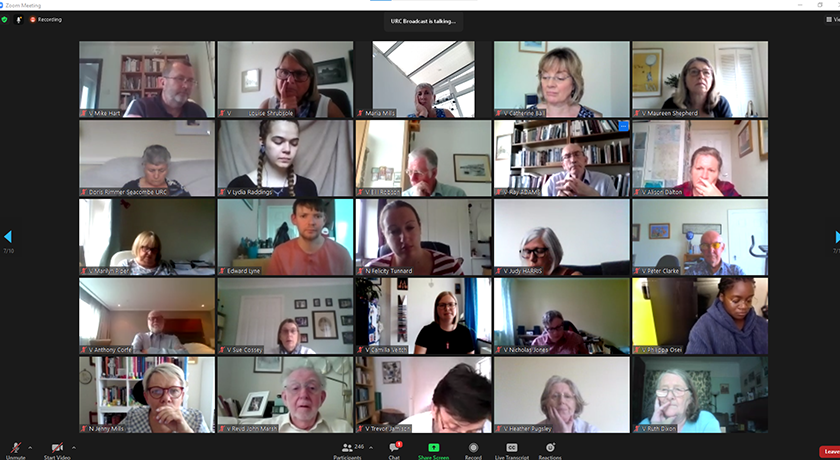 General Assembly then gathered in buzz groups to discuss an array of questions to assist the group in its work.
General Assembly then gathered in buzz groups to discuss an array of questions to assist the group in its work.
Questions included: what gives you hope for the life of the URC, what new work would you love to see the group engage with, what do you think the group might most helpfully need to find out about the URC’s existing life to help it think about the URC’s future life.
Session 2
Finance Committee
Despite the pandemic, central budgeted funds were in surplus in 2020, began the reports from the Finance Committee.
The impact of coronavirus will be monitored at all levels of the church, as it will be some time before the committee can assess what bearing it has had on the Church’s future financial state.
As a result of the generous giving of most congregations to support the central fund, and with the financial support of Synods, M&M contributions were a little more than half a million down on the £18.5 million budget expectations, with total income reduced by just a little under £750,000 compared to the budget.
At the same time, budgeted expenditure was cut by more than £900,000, leaving the fund with a small surplus of almost £95,000.
It was extremely difficult for the committee make firm budget projections for 2021. However, it persuaded Mission Council to adopt the budget despite the uncertainties about future income.
The projected outcome is a deficit in the year of £358,000, which will be met from the URC Trust’s reserves.
URC Pensions schemes
Through a video presentation available before the Assembly and in the committee’s report, Ian Hardie and John Piper, the URC’s Treasurer and Deputy Treasurer, told the Church that the challenges faced by our pensions schemes was a family problem requiring a family solution.
The future of the schemes should not be kicked into the long grass to leave for our successors to deal with. Rather, action to lay the groundwork for future changes is needed now.
John Piper explained that the URC has done nothing wrong.
The annual costs of the Ministers’ Pension Fund are about to rise because the Pensions Regulator has insisted on even more of a prudent approach, on top of the substantial increase in costs caused by continued low interest rates.
Papers G3 and G4 looked at challenges from the past and in the future.
The valuation, John Piper explained, that takes place every three years in 2018 had reported a £9m surplus. But that has changed and the likely valuation in 2021 will be a £25m deficit.
The committee knew the challenges were coming and are making plans accordingly.
In the last two months, offers of up to £45m have been made – “amazing and humbling”, Mr Piper said.
He asked the Assembly to express it thanks for the generosity, and explained that those offers would need to be agreed by the bodies that had offered them later this year.
Paper G4 included three interlinked resolutions.
Resolution 19 offered a basis for what the church will do, not to reduce the pensions of office holders or staff, but aiming to provide good pensions in a different and sustainable way.
John Bradbury, the General Secretary, explained that because of the conflict of interest of those in the scheme, advice had been sought from the Charity Commission and an Order to address this issue has been granted.
It said that the Trust was able to take direction from General Assembly without those in the scheme having to recluse themselves. The URC being a conciliar church, the Trust may take the decision of the assembly to guide all, and also applies to Synods.
The Revd Steve Faber wondered if part b) of the resolution was honourable, because of the potential risk of 50% of the entitlement being at risk.
John Piper said that the principles in the resolution lays down markers against which future decisions should be judged.
Morag Donaldson asked if the changes were applicable in Scotland where pensions laws differ. Romilly Micklem said the Pensions Regulator is not devolved and so its decisions apply to the whole of the United Kingdom.
The resolution was carried.
Resolution 20 asked for a decision in principle on the understanding that the two schemes would carry on as before until detailed proposals are presented to be agreed by a future assembly.
Resolution 21 asked for the authority to detail those proposals using money not currently in the budget.
Extra prudence in the valuation on top of low interest rates would mean huge rises in contributions.
Employers contributions would cost 2.1m in 2020 and the estimated cost is 3.8m in 2022. By 2030 the contributions would be 4.2m, an increase of 45%. Are these increases affordable and value for money, Mr Piper asked.
Almost all the income comes from M&M fund, and the church is fortunate that it can afford this for now.
The objective, Mr Piper continued, is to provide equivalent benefits at a sustainable cost in a well-managed scheme.
After discussions in buzz groups, a number of comments were made.
The Revd Steve Faber asked if the Pensions Trust would provide financial support so the best advice could be given.
Clare Nutbrown-Hughes asked what kind of ongoing financial commitment would the Church have and what costs would be needed?
Andy Braunston asked if more work could be done on the percentages of contributions.
Scott Wheeler wondered if advice available to retiring ministers about the options on final options on their pensions.
Alan Yates asked how the 45% increase projected before 2030 included the £45m offered to the schemes.
John Piper responded by saying that advisors cost around £100,000 per year, a cost that would continue, and that deficits may continue. But, he added, as pension schemes mature, assets are moved into less risky investments, and the likelihood of liabilities would reduce. Any new scheme would include advice for all members.
David Thompson wondered whether there might be the possibility of reversing the order of 20 and 21. Further work has to be done, he said, but a lot of very careful work has been done already. Defined Contribution is the way forward, he concluded.
Steven Manders asked if members are fully equipped to understand the extent of the changes, and that the implications are so serious that they need to have more information from sources independent of the URC.
Andrew Atkinson was grateful for the huge amount of work already done and mirrored Victoria Turner’s comment that the Social Justice Network had reservations about changes to the schemes and its impact on vulnerable people.
In his responses, John Piper said extensive Information and advice would be provided by the provider, the church and from those who are independent.
Resolution 21 being taken first could raise further issues about balancing the M&M fund, and at least two years of increased contributions.
The concerns raised about the impact of vulnerable people would be addressed.
Alex Clare-Young said that the Church was between a rock and a hard place and acknowledged that it was difficult to make decisions at this point.
He believed advice from an independent specialist could be made to mitigate possible injustices.
He proposed an amendment which was accepted by the committee for Diversity, Equity, and Inclusion (DEI) specialists to be consulted in the process in the run up to the next round of decisions at next year’s General Assembly.
Victoria Turner said that there are wider moral and ethical issues in the protection of employees, and Romilly Micklem said that lengthy discussions about ethics, morals and stewardship had taken place.
He further shared that there are two separate sources of free advice already available to members of the schemes.
The amended resolution was remaindered to a later session.
Election of Moderator of General Assembly 2022-2023
The Revd Nigel Uden, former Moderator of General Assembly, chaired the election of the next Assembly Moderator.
After making presentations to introduce themselves to the Assembly, the candidates were each asked to speak on the question: ‘In these days of change for the United Reformed Church, how do you understand the role of Moderator of its General Assembly, and what would you hope to bring to it?’
Voting is now open, and the result will be announced on Sunday morning.
Paper I1: Mission Committee Report
Sarah Lane Cawte, Convenor of the Mission Committee, presented this report on the work of the committee over the past year. It includes updates on Church and Society, Ecumenical and Interfaith Relations, Global and Intercultural Ministries (including Commitment for Life), Mission and Evangelism, Fresh Expressions and Rural Mission.
Paper I2: Israel Palestine Report
Sarah Lane Cawte, Convenor of the Mission Committee, along with the Revd Philip Brooks, Secretary for Ecumenical and Interfaith Relations, presented this paper to General Assembly. The paper includes ten resolutions to further the URC’s solidarity with Palestinian Christian communities. The resolutions ask the United Reformed Church to support Palestinian partners through pilgrimage, lobbying, ethical investment and trade.
Mrs Lane Cawte said that the paper followed on from previous Assembly resolutions on Israel and Palestine in 2016, 2018 and 2020, but now focusing on action where they focused on principle. The resolutions have been worded carefully, after consultation with relevant parties, Ms Lane Cawte said, so she asked Assembly where possible to focus on the substance resolution in each case, rather than amending the wording. She thanked URC Youth for their response and comments on the paper.
Assembly heard a recorded message from the Revd Dr Munther Isaac, the Minister of the Evangelical Lutheran Christmas Church in Bethlehem, thanking the URC for debating these proposals. Dr Isaac said that the resolutions were not anti anyone, but addressed the unjust situation in which Palestinians and Israelis find themselves. He thanked the URC for listening to Palestinian Christians and urged them to go beyond good wishes and take a stand for justice. Without Churches putting pressure on Israeli government, he said, peace could not come in the Holy Land.
Members of Assembly had questions on some of the resolutions. Asked why resolution 26 specified engaging with Christians, Ms Lane Cawte said this was not intended to be exclusive, but was a matter of deepening existing relationships.
On resolution 30, where Assembly ‘urges’ the Israeli government to abide by international law, the question was how such urging is supposed to be conveyed. Mr Brooks said the answer to that was to be found in the following five resolutions.
As resolution 31 asks URC members to contact their MPs, members of Assembly asked for suggested wording to be provided. While the Mission Committee would not be averse to that, it was pointed out that MPs respond much better when people write in their own words. Asked if people might contact the Foreign Office as well as their MPs, Mr Brooks explained that direct approaches from voters to any government department would be ignored, but if one can get one’s MP to do write to the Foreign Secretary, the minister is obliged to respond. In response to a request for a simplified version of the information in paper I2, Mr Brooks said that the 22 people who went on the URC pilgrimage to the Holy Land in 2019 were available to come and talk on the subject.
Resolution 33 asks synod trusts not to invest in companies facilitating certain activities. It was pointed out that trusts can never be certain about where all their investments are, and so the phrase ‘ensure that they do not invest’, was changed to ‘avoid knowingly investing directly’.
Resolutions 26-33 were all passed by large majorities. Because of time strictures, Assembly did not vote today on resolutions 34 and 35, and will return to them later.
Words by Ann-Marie Nye, Steve Tomkins and Andy Jackson
